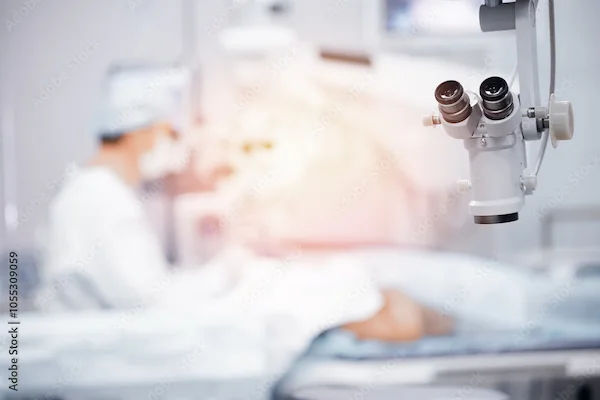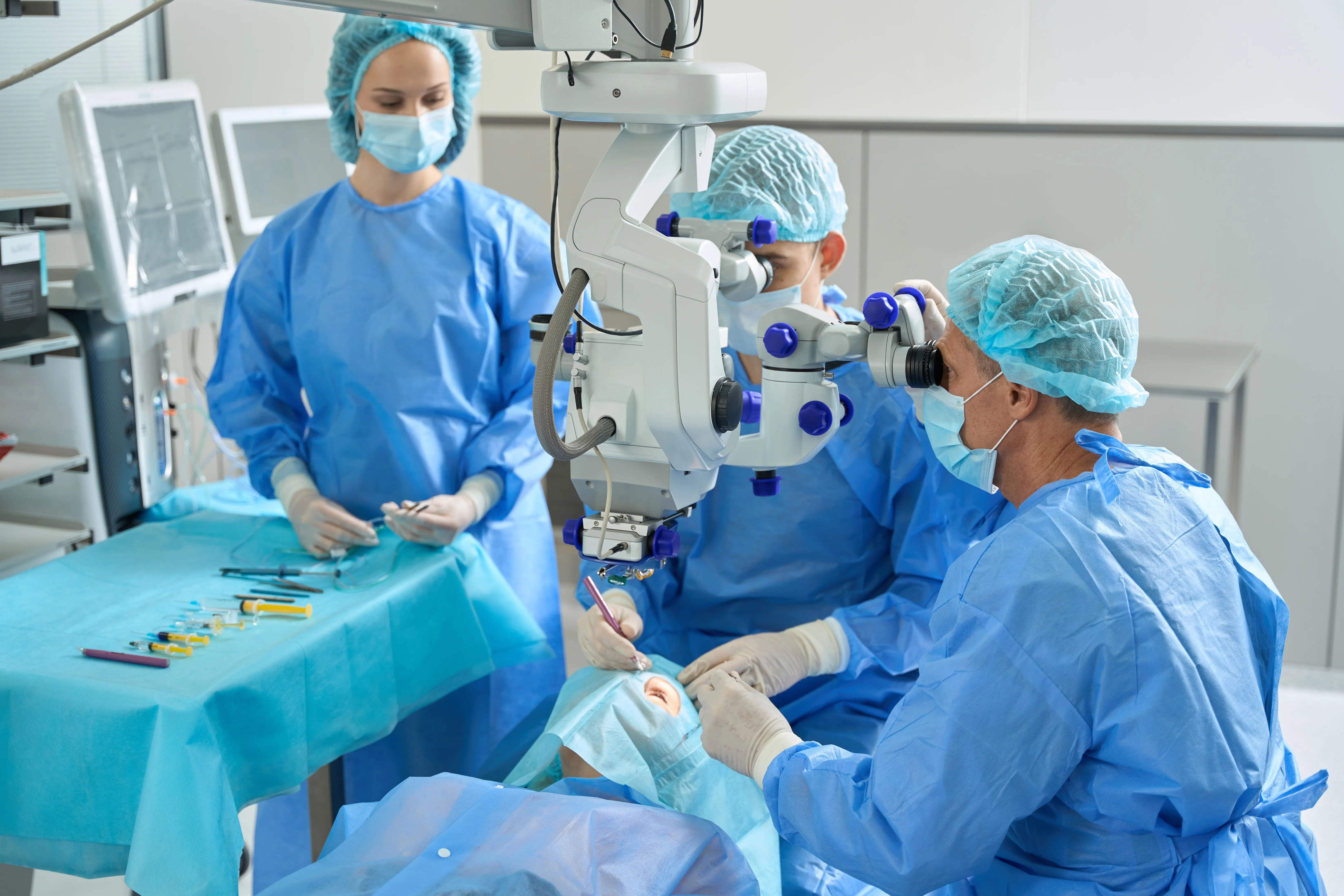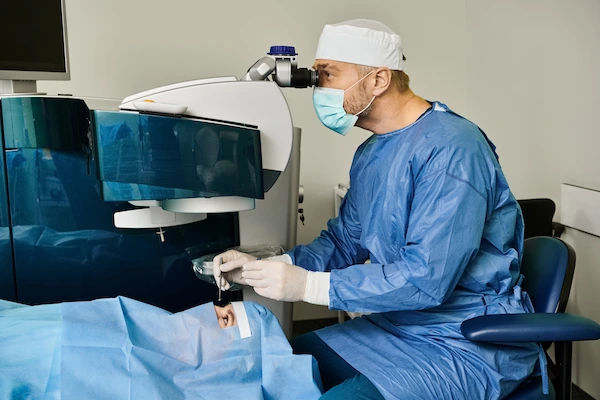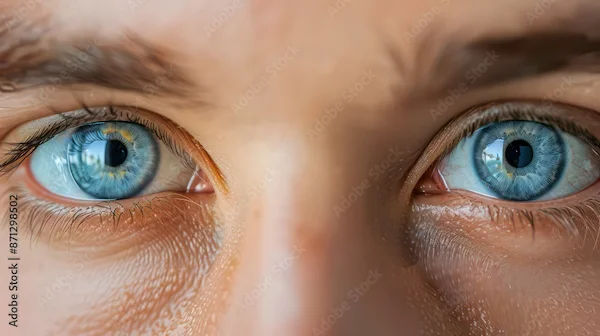What Do You See During Cataract Surgery?
Wondering what you’ll see during cataract surgery? Learn what to expect during the procedure, including sensations, vision changes, and recovery tips.

Written by Dr.Sonia Bhatt
Last updated on 13th Jan, 2026

Introduction
If you or a loved one has been diagnosed with cataracts, you might be curious—or even a little nervous—about what happens during cataract surgery. Rest assured, this is one of the safest and most common eye surgeries performed worldwide. Let’s walk through what you can expect to see (or not see) during the procedure, so you feel informed and at ease.
Understanding Cataracts
Before diving into the surgery, it’s helpful to know what cataracts are. A cataract is a clouding of the eye’s natural lens, which lies behind the iris (the colored part of the eye). This cloudiness can make your vision blurry, dim, or cause glare from lights, making everyday activities like reading or driving difficult.
Consult Top Specialists for Personalised Health Advice
What Happens During Cataract Surgery?
Cataract surgery is a quick and painless procedure that usually takes about 15-30 minutes per eye. Here’s what you can expect:
1. Before the Surgery
Eye Drops – You’ll be given numbing drops to ensure you don’t feel any pain.
Mild Sedation (Optional) – Some patients receive a light sedative to help them relax.
2. During the Surgery
You Won’t See the Surgical Tools – Since your eye is numbed and covered, you won’t see the surgeon’s instruments.
Possible Light Sensations – You may see bright lights or vague movements, but everything will appear blurry.
No Pain – The procedure is painless, though you might feel slight pressure.
3. The Surgical Steps
Small Incision – The surgeon makes a tiny cut in the cornea, the clear front part of the eye.
Breaking Up the Cataract – Using ultrasound waves (phacoemulsification), the cloudy lens is gently broken into small pieces and removed.
Inserting the New Lens – An artificial intraocular lens (IOL) is placed in the same position as your natural lens.
No Stitches Needed – The incision is so small that it heals on its own.
4. After the Surgery
Recovery is Quick – Most people notice improved vision within a few days.
Protective Shield – You’ll wear an eye shield for a day or two to prevent accidental rubbing.
Follow-Up Visits – Your doctor will check your healing progress.
Will You Be Awake During the Surgery?
Yes, but don’t worry—you won’t see the surgery happening. Since your eye is numbed and covered, you’ll only perceive light and shadows. Many patients describe it as a quick, painless experience.
Tips for a Smooth Recovery
A few simple steps can help protect your eyes and speed up healing.
Avoid Rubbing Your Eye – This can interfere with healing.
Use Prescribed Eye Drops – These prevent infection and reduce inflammation.
Wear Sunglasses – Protect your eyes from bright light.
Avoid Strenuous Activities – Give your eye time to heal.
When to Seek Help
If you experience severe pain, sudden vision loss, or increased redness, contact your doctor immediately.
If you suspect you have cataracts or need surgery, Apollo 24|7 offers expert consultations and advanced cataract treatments. You can easily schedule an appointment or order an eye test through the Apollo 24|7 app or website.
Final Thoughts
Cataract surgery is a simple, safe, and life-changing procedure. Knowing what to expect can help ease any anxiety. With modern techniques, most patients enjoy clearer vision and a better quality of life afterward.
If you have concerns, don’t hesitate to reach out to an eye specialist. Your vision is precious—take care of it!
Consult Top Eye Specialists
Consult Top Specialists for Personalised Health Advice
Dr. Padmini S
Ophthalmologist
4 Years • MBBS,MS
Bengaluru
Apollo Medical Center, Marathahalli, Bengaluru
Dr. Venkateswaran Sivaprakasam
Ophthalmologist
42 Years • MBBS, Diploma in Ophthalmology
Tiruvannamalai
Shiva Eye And General Hospital, Tiruvannamalai
Dr. Akashdipta Saha
Ophthalmologist
4 Years • MBBS, MD(Ophthalmology), Fellowship in Retina & Vitreous
Delhi
AIIMS, Delhi
Dr. Harshavardhan Reddy
Ophthalmologist
3 Years • MBBS , MS (Ophthalmology)
Hyderabad
Ram Dev Rao Hospital, Hyderabad

Dr. K Sreekumar Reddy
Ophthalmologist
26 Years • MBBS MD (Ophthalmology) EGESTOLP
Hyderabad
Apollo Hospitals Jubilee Hills, Hyderabad
(25+ Patients)
Consult Top Eye Specialists
Dr. Padmini S
Ophthalmologist
4 Years • MBBS,MS
Bengaluru
Apollo Medical Center, Marathahalli, Bengaluru
Dr. Venkateswaran Sivaprakasam
Ophthalmologist
42 Years • MBBS, Diploma in Ophthalmology
Tiruvannamalai
Shiva Eye And General Hospital, Tiruvannamalai
Dr. Akashdipta Saha
Ophthalmologist
4 Years • MBBS, MD(Ophthalmology), Fellowship in Retina & Vitreous
Delhi
AIIMS, Delhi
Dr. Harshavardhan Reddy
Ophthalmologist
3 Years • MBBS , MS (Ophthalmology)
Hyderabad
Ram Dev Rao Hospital, Hyderabad

Dr. K Sreekumar Reddy
Ophthalmologist
26 Years • MBBS MD (Ophthalmology) EGESTOLP
Hyderabad
Apollo Hospitals Jubilee Hills, Hyderabad
(25+ Patients)




